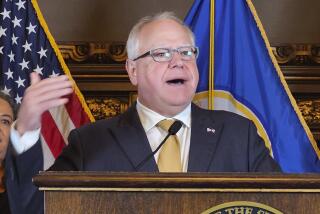Dukakis: Deals and Double Roles
- Share via
IRVINE — Gov. Michael S. Dukakis’ win in last week’s Wisconsin presidential primary puts the lie to two myths: “Dukakis can’t win the blue collar vote” and “Jesse Jackson could win the white vote,” particularly the crossover Republican vote. It didn’t happen that way in the Dairy State.
I think it’s safe to say that Dukakis of Massachusetts will be the Democratic nominee for President, barring some big mistake--the kind Dukakis doesn’t often make. Yet it will take time, in the retail nickel-and-dime way delegates are apportioned by Democratic rules, to make it official. While the impressive 20-point Dukakis win makes it easier to pick up political endorsements, it also may reduce whatever “stop Jackson” pressure exists among the voters, allowing them to send new messages, protest or otherwise, for Jackson or Sen. Albert Gore Jr. of Tennessee.
For Dukakis, Wisconsin was more than a first place finish. Coupled with wins in Connecticut and Colorado the same week, he is the undisputed leader and should gain increased confidence. Confidence is not a personal commodity the Massachusetts governor has ever been short of but now his campaign organization also exudes it.
Dukakis has to play the game two ways from now on: appearing both as a candidate (one cannot presume nomination--or at least not be seen to presume it) and as the prospective nominee (the fall is not far off--better start running toward the middle of the road). I believe Dukakis is smart enough and tough enough to perform this schizophrenic role well.
Reporters will be looking for deals, their pejorative word for agreements between campaigns and candidates on how issues should be resolved. To the media deals are bad, but the experts do not expect that any candidate will have the majority needed to nominate after the California primary on June 7. There will be post-primary discussions among candidates and others, including the ex officio super-delegates. These are not so much deals as accommodations to reality, and Dukakis’ handling of them should be like much else he does--competent.
Looking to the fall, Dukakis has to start spelling out his general-election themes and vision for America in the 1990s and beyond. He has the attention of the Democratic primary participants and the media--it’s time he started attracting the country. It’s also a great opportunity; people are listening now that the Republican race is off the front page for a while.
Dukakis should tell the people how he wants to change America and how he wants to pay for it--they’re grown-ups and they know there is no free lunch. A generation ago, another native of Brookline, Mass., caught the people’s spirit and rode their hopes to the moon. John F. Kennedy certainly never talked like a bean-counting city manager.
Jackson can look forward to New York, if not with a boost, at least as a greener pasture. In Wisconsin, he ran behind published polls, and got--as in all other primaries outside the South--less than 30% of the vote. Although New York is not a caucus state (where Jackson does well by turning out his committed), the black population there is three to four times Wisconsin’s, and he had proved his strength in urban areas before. About that question: “What does Jesse want?”--I say he wants to be President of the United States, now or later.
For Gore, Wisconsin looks to be too little too late. He received 17% in Wisconsin. Had he showed such numbers in the primaries right after Super Tuesday, he might have had a shot. But now his role is either as a spoiler or a vice presidential aspirant, a distinction that lies in the eye of the beholder. Gore faces a more immediate hurdle: money. He fell below 10% of the popular vote in two consecutive primaries (Illinois and Connecticut), putting him in jeopardy of a cutoff in federal matching funds unless he gets 20% in a subsequent primary. He missed that threshold in Wisconsin, and will lose matching funds on April 28 unless he wins at least 20% in New York or Pennsylvania.
Primaries in New York, Pennsylvania and Ohio should sort this race out in the next three weeks. So should the Federal Election Commission rules on matching funds. Still, this election year of surprises could produce yet another one. It’s always fun to watch the other guys fighting it out after your guy’s nomination is all wrapped up. Enjoy it, George, it’s only a respite; they’ve gotten their act together before, and who knows, they may again.
More to Read
Get the L.A. Times Politics newsletter
Deeply reported insights into legislation, politics and policy from Sacramento, Washington and beyond. In your inbox twice per week.
You may occasionally receive promotional content from the Los Angeles Times.










